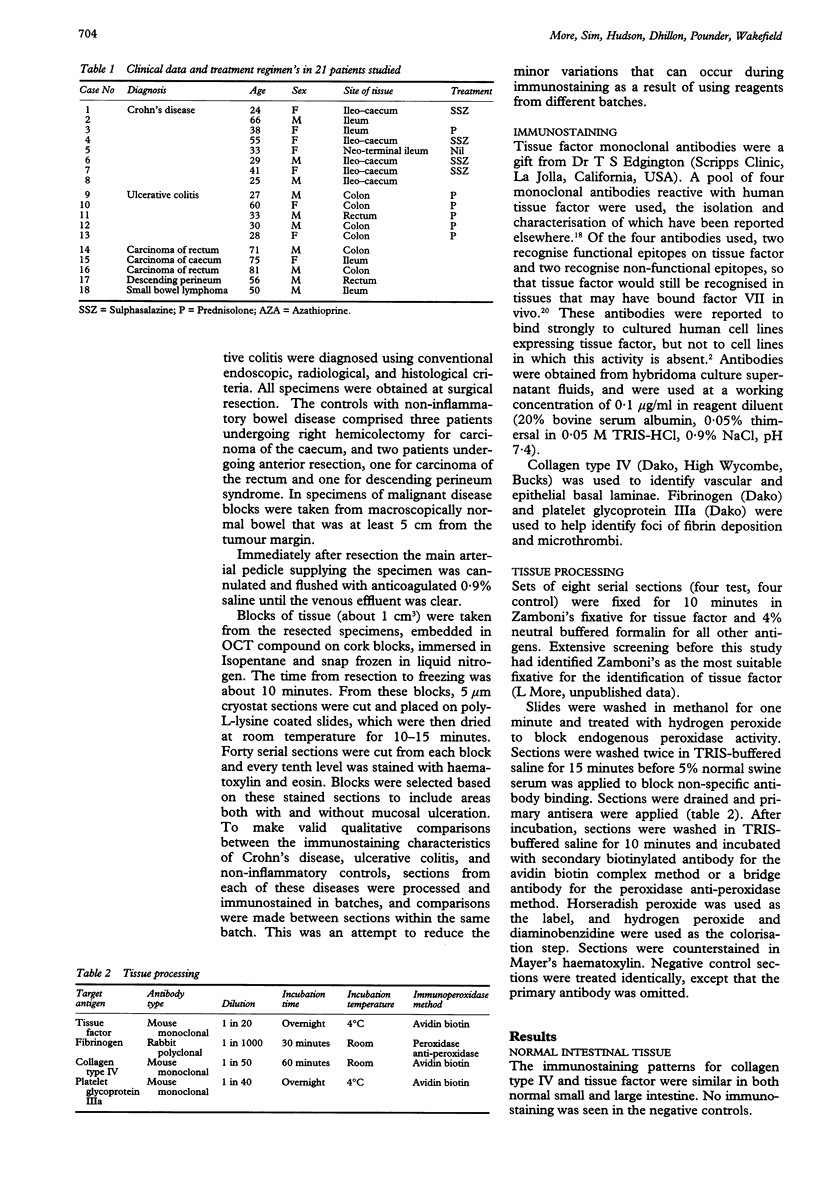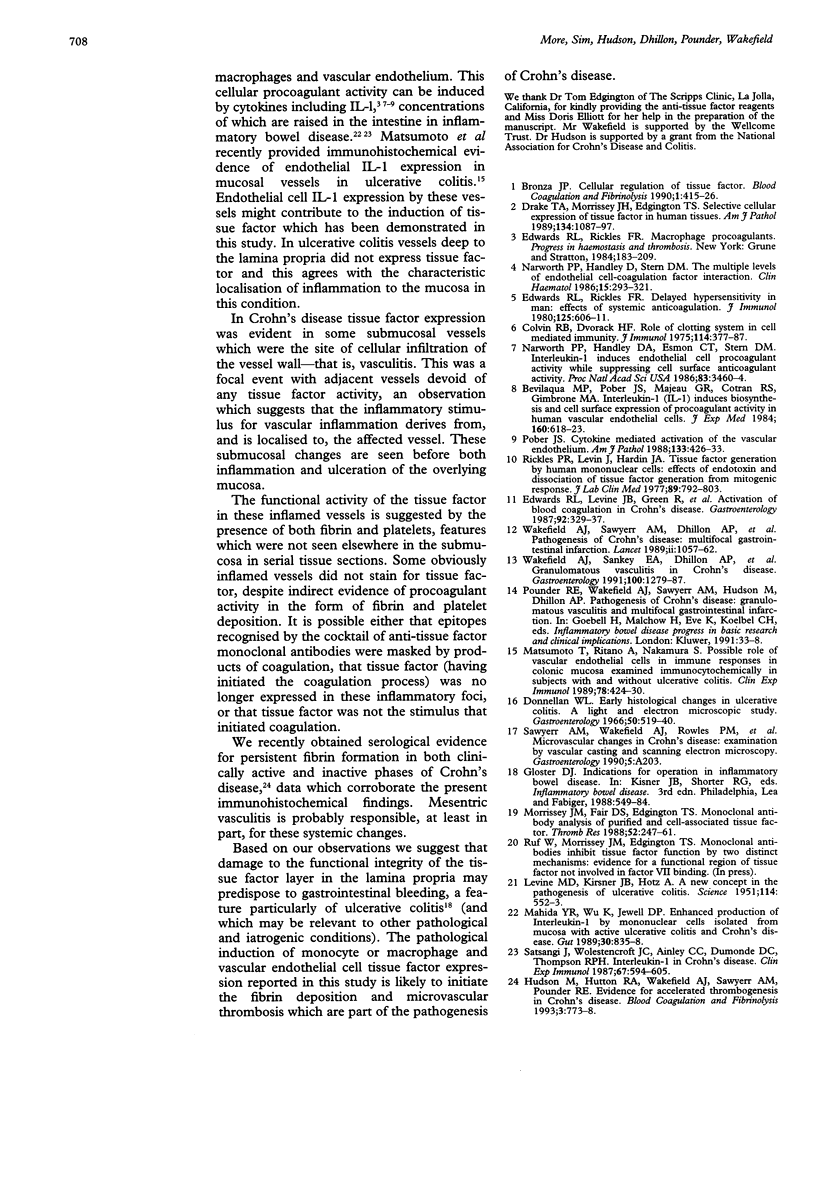Abstract
AIMS--To investigate the localisation of tissue factor expression in normal and inflamed intestine. METHODS--Serial cryostat sections of tissue taken from patients with Crohn's disease (n = 8), ulcerative colitis (n = 5), and from controls (n = 5) were stained with haematoxylin and eosin and immunostained for tissue factor, collagen type IV, fibrinogen and platelet glycoprotein IIIa. RESULTS--In control tissues tissue factor was present as a continuous layer along the epithelial basal lamina: sections from controls did not immunostain for fibrinogen or platelets. In non-ulcerated inflamed mucosa, tissue factor staining intensified in cases of Crohn's disease and was associated with fibrin deposition. Staining for tissue factor was either patchy or absent in cases of ulcerative colitis and there was no fibrin deposition. This change accompanied the early destruction of the epithelial basal lamina in ulcerative colitis that was not seen in Crohn's disease. In both diseases tissue factor expression in severely inflamed and ulcerated mucosa was present on lamina propria macrophages and vascular endothelium and was associated with fibrin or platelet thrombi. In three of eight cases of Crohn's disease tissue factor expression and thrombi were evident in areas of submucosal vasculitis. These were not seen in adjacent normal vessels. CONCLUSIONS--These observations are consistent with a tissue factor haemostatic barrier in the intestine: this barrier seems to be incomplete or defective in ulcerative colitis. Tissue factor expression by macrophages and endothelial cells may be important, particularly in the microvascular thrombosis and induration which are characteristic of Crohn's disease.
Full text
PDF





Images in this article
Selected References
These references are in PubMed. This may not be the complete list of references from this article.
- Bevilacqua M. P., Pober J. S., Majeau G. R., Cotran R. S., Gimbrone M. A., Jr Interleukin 1 (IL-1) induces biosynthesis and cell surface expression of procoagulant activity in human vascular endothelial cells. J Exp Med. 1984 Aug 1;160(2):618–623. doi: 10.1084/jem.160.2.618. [DOI] [PMC free article] [PubMed] [Google Scholar]
- Brozna J. P. Cellular regulation of tissue factor. Blood Coagul Fibrinolysis. 1990 Oct;1(4-5):415–426. doi: 10.1097/00001721-199010000-00009. [DOI] [PubMed] [Google Scholar]
- Colvin R. B., Dvorak H. F. Role of the clotting system in cell-mediated hypersensitivity. II. Kinetics of fibrinogen/fibrin accumulation and vascular permeability changes in tuberculin and cutaneous basophil hypersensitivity reactions. J Immunol. 1975 Jan;114(1 Pt 2):377–387. [PubMed] [Google Scholar]
- Donnellan W. L. Early histological changes in ulcerative colitis. A light and electron microscopic study. Gastroenterology. 1966 Apr;50(4):519–540. [PubMed] [Google Scholar]
- Drake T. A., Morrissey J. H., Edgington T. S. Selective cellular expression of tissue factor in human tissues. Implications for disorders of hemostasis and thrombosis. Am J Pathol. 1989 May;134(5):1087–1097. [PMC free article] [PubMed] [Google Scholar]
- Edwards R. L., Levine J. B., Green R., Duffy M., Mathews E., Brande W., Rickles F. R. Activation of blood coagulation in Crohn's disease. Increased plasma fibrinopeptide A levels and enhanced generation of monocyte tissue factor activity. Gastroenterology. 1987 Feb;92(2):329–337. [PubMed] [Google Scholar]
- Edwards R. L., Rickles F. R. The role of human T cells (and T cell products) for monocyte tissue factor generation. J Immunol. 1980 Aug;125(2):606–609. [PubMed] [Google Scholar]
- Hudson M., Hutton R. A., Wakefield A. J., Sawyerr A. M., Pounder R. E. Evidence for activation of coagulation in Crohn's disease. Blood Coagul Fibrinolysis. 1992 Dec;3(6):773–778. doi: 10.1097/00001721-199212000-00011. [DOI] [PubMed] [Google Scholar]
- LEVINE M. D., KIRSNER J. B., KLOTZ A. P. A new concept of the pathogenesis of ulcerative colitis. Science. 1951 Nov 23;114(2969):552–553. doi: 10.1126/science.114.2969.552. [DOI] [PubMed] [Google Scholar]
- Mahida Y. R., Wu K., Jewell D. P. Enhanced production of interleukin 1-beta by mononuclear cells isolated from mucosa with active ulcerative colitis of Crohn's disease. Gut. 1989 Jun;30(6):835–838. doi: 10.1136/gut.30.6.835. [DOI] [PMC free article] [PubMed] [Google Scholar]
- Matsumoto T., Kitano A., Nakamura S., Oshitani N., Obata A., Hiki M., Hashimura H., Okawa K., Kobayashi K., Nagura H. Possible role of vascular endothelial cells in immune responses in colonic mucosa examined immunocytochemically in subjects with and without ulcerative colitis. Clin Exp Immunol. 1989 Dec;78(3):424–430. [PMC free article] [PubMed] [Google Scholar]
- Morrissey J. H., Fair D. S., Edgington T. S. Monoclonal antibody analysis of purified and cell-associated tissue factor. Thromb Res. 1988 Nov 1;52(3):247–261. doi: 10.1016/0049-3848(88)90084-9. [DOI] [PubMed] [Google Scholar]
- Nawroth P. P., Handley D. A., Esmon C. T., Stern D. M. Interleukin 1 induces endothelial cell procoagulant while suppressing cell-surface anticoagulant activity. Proc Natl Acad Sci U S A. 1986 May;83(10):3460–3464. doi: 10.1073/pnas.83.10.3460. [DOI] [PMC free article] [PubMed] [Google Scholar]
- Nawroth P. P., Handley D., Stern D. M. The multiple levels of endothelial cell-coagulation factor interactions. Clin Haematol. 1986 May;15(2):293–321. [PubMed] [Google Scholar]
- Pober J. S. Warner-Lambert/Parke-Davis award lecture. Cytokine-mediated activation of vascular endothelium. Physiology and pathology. Am J Pathol. 1988 Dec;133(3):426–433. [PMC free article] [PubMed] [Google Scholar]
- Rickles F. R., Levin J., Hardin J. A., Barr C. F., Conrad M. E., Jr Tissue factor generation by human mononuclear cells: effects of endotoxin and dissociation of tissue factor generation from mitogenic response. J Lab Clin Med. 1977 Apr;89(4):792–803. [PubMed] [Google Scholar]
- Satsangi J., Wolstencroft R. A., Cason J., Ainley C. C., Dumonde D. C., Thompson R. P. Interleukin 1 in Crohn's disease. Clin Exp Immunol. 1987 Mar;67(3):594–605. [PMC free article] [PubMed] [Google Scholar]
- Wakefield A. J., Sankey E. A., Dhillon A. P., Sawyerr A. M., More L., Sim R., Pittilo R. M., Rowles P. M., Hudson M., Lewis A. A. Granulomatous vasculitis in Crohn's disease. Gastroenterology. 1991 May;100(5 Pt 1):1279–1287. [PubMed] [Google Scholar]
- Wakefield A. J., Sawyerr A. M., Dhillon A. P., Pittilo R. M., Rowles P. M., Lewis A. A., Pounder R. E. Pathogenesis of Crohn's disease: multifocal gastrointestinal infarction. Lancet. 1989 Nov 4;2(8671):1057–1062. doi: 10.1016/s0140-6736(89)91078-7. [DOI] [PubMed] [Google Scholar]











